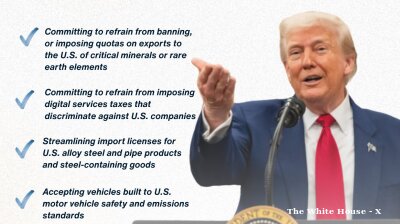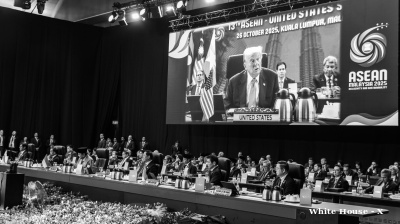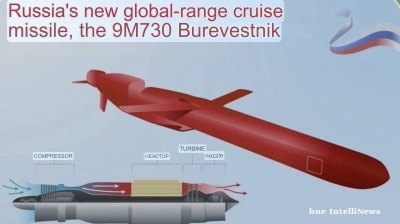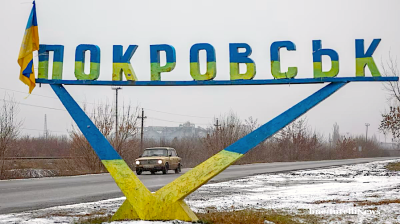The United States has lifted sanctions on Belarus’s state-owned airline Belavia, US Presidential Representative John Cole announced during a meeting with Belarusian President Alexander Lukashenko, BelTA reported on September 11.
"I want to state quite officially that we have lifted sanctions on Belavia. It is official. The decision was made by [US] President Donald Trump, who said: 'Do it immediately,'" Cole said.
Cole added that the decision had been approved and coordinated by all relevant US agencies, including the State Department, the Department of Commerce and the Department of the Treasury.
Lukashenko has been flirting with the Trump administration for several months, hoping to improve his relations with the West in order to get some sanctions relief as well as some leverage in his relations with Russian President Vladimir Putin. Since aiding Russia’s invasion of Ukraine in 2022, Belarus has also been put under a heavy sanctions regime and Minsk has become entirely dependent on Moscow.
It could be that the decision to lift sanctions on Belavia is a direct result of Minsk warning Warsaw of the imminent Russian drone incursion into Polish airspace September 10, causing international outrage.
General Wiesław Kukuła, Chief of the General Staff of the Polish Armed Forces, said the advance warning was “helpful for us” but somewhat “surprising,” given Belarus’ support for Russia in the war in Ukraine, and tensions along the border with Poland.
“The Belarusians warned us that drones were heading towards us through their airspace,” the general said, adding that Poland accepted the tip-off and reciprocated by sharing information about objects flying towards Belarus.
“It was surprising to me that Belarus, which is really trying to escalate the situation on our land border, decided to cooperate in this way,” he told TVN24.
Prior to the drone warning, In June there was another gesture. The high profile political prisoner Sergey Tikhanovsky (Siarhei Tsikhanouskiy), husband of Belarusian opposition leader Svetlana Tikhanovskaya (Sviatlana Tsikhanouskaya), was released from prison following a US-brokered pardon after envoy Keith Kellogg met with Lukashenko in Minsk. The release marked the dramatic thawing in US-Belarus relations.
The United States imposed sanctions on the Belarusian airline Belavia on April 8, 2022. Although Belavia was singled out for having “helped incite and organise illegal border crossings through Belarus to the EU”, the sanctions stopped short of a general flight ban to prevent the airline crossing EU territory, which had been suggested.
Washington had imposed restrictions on Belavia on April 8, 2022, banning flights to Belarus or Russia by US-owned, controlled or operated aircrafts. In June that year, the US Department of Commerce further tightened sanctions on the airline, citing violations of export controls.
The measures prohibited companies worldwide from servicing, repairing or otherwise using American parts or equipment to maintain Belavia’s fleet.
The European Union introduced its own sanctions against Belavia in December 2021, accusing the carrier of facilitating illegal migration by transporting citizens of the Middle East and North Africa. Belavia rejected the accusations, stating it had no role in such activities.
In May 2024, the Court of Justice of the European Union dismissed a lawsuit filed by Belavia, which sought to challenge the bloc’s restrictions.
"The decision was made by President Trump, who said: 'Do it immediately,'" Cole reiterated during his meeting with Lukashenko.
Trump and Lukoshenko's relationship has been warming. “It seems that months of cautious contact with Washington, measured concessions, and concerted messaging from Lukashenko eventually produced the desired result.”
When Donald Trump picked up the phone en route to his meeting with Russian President Vladimir Putin in Alaska on August 15, his brief call with Belarusian leader Alexander Lukashenko marked an unprecedented diplomatic moment. It was the first time in Lukashenko’s 31 years in power that a sitting US president had spoken to him—an event less significant to Trump’s agenda that day, but momentous in Minsk.
That Trump referred to Lukashenko as “highly respected President” on social media only added to the symbolism, given the West’s long-standing refusal to recognise him as the legitimate head of state following the violently disputed 2020 election. He also thanked Lukashenko for releasing 16 political prisoners—although he avoided using the word “political”—and said he hoped more would follow.
Lukashenko has offered to release 1,300 political prisoners, but only if they leave the country, as he seeks to improve ties with the Trump administration further, The Kyiv Independent reported on August 28.
The latest proposal comes after he released 14 political prisoners last month, including Sergey Tikhanovsky (Siarhei Tsikhanouskiy), the husband of Belarusian opposition leader Svetlana Tikhanovskaya (Sviatlana Tsikhanouskaya) who contested the 2020 presidential elections in his stead after he was arrested before the poll.Since the war in Ukraine broke out, instead of throwing US support behind Kyiv and offering it security guarantees, Trump has demanded the $350bn he claims the US has spent on the three year war in Ukraine, which some have labelled as reparations.
But others say that this dramatic volte-face is actually a clever change in US foreign policy. Trump is attempting a “reverse Nixon”. By cozying up to Russian President Vladimir Putin, who is obviously very interested in doing deals with the US, he is attempting to “peel Russia off” from its “no limits” relationship with China.
News

US Treasury Secretary Bessent blasts “Russian propagandist” special envoy Dmitriev in Washington PR debacle
A trip to Washington by the Kremlin’s special business envoy Kirill Dmitriev days after the US imposed new oil sanctions turned into a debacle after US Treasury Secretary Scott Bessent blasted him as a “Russian propagandist.”

Trump pledges enduring support for Southeast Asia as new trade deals signed
During his visit to Southeast Asia, US President Donald Trump declared that Washington would remain a steadfast ally to the region, as he signed a series of trade agreements with four ASEAN member states.

US grants 0% tariffs to Malaysia alongside Cambodia and Thailand
US President Donald Trump has approved a 0% tariff scheme for selected goods from Malaysia, Cambodia, and Thailand, a move formalised during the ASEAN Summit in Kuala Lumpur.

Russia test fires its Burevestnik nuclear-powered cruise missile
Russia’s Burevestnik nuclear-powered cruise missile has no analogues in the world, Russian President Vladimir Putin said, as the Kremlin escalates the unfolding missile arms race with Ukraine another notch.

_0.jpg)


